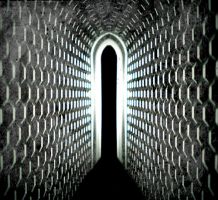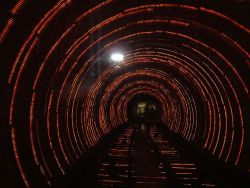
image: andy emcee
There's good work coming out of Caltech this month supporting the idea - familiar to readers of FQXi Community - that the universe in which we live is the result of a spontaneous quantum fluctuation. This is the scenario often referred to in the press as "creation out of nothing," a catchphrase that makes me cringe. Indulge me for a moment on this.
To put it flatly, "nothingness" doesn't fluctuate. Nor does it do anything else -- including exist, if we follow the ontological implications of English and take "to be" as a verb. Here the language itself may be misleading us; I spoke with an Indian philosopher a few years ago who argued compellingly that we western thinkers are all hopelessly confused in our ontology by the simple fact that it is possible to employ "be verbs" in English without any object in the predicate. (Hang on - it's painless.) We can say "the peach trees are," for example, and stop there, without having to say *what* they are: green, fresh, tall, over here. Such a construction isn't possible in all languages, and it may not be irrelevant. The tacit implication is that "the peach trees are" has meaning, which, when you think about it, cannot be demonstrated; and inasmuch as language is naturally assumed by speakers to reflect reality, the second implication is that "are" is therefore a quality among other qualities.
A lot of ink was spilled in the late 18th and early 19th century over this exact question, leading the German Idealists to demand such things as what the difference could possibly be between having five heavy, silver coins in my pocket and five heavy, silver, existing coins in my pocket. (Try it this way: if existence is a predicate, you should be able to make sense of the sentence, "I have five heavy, silver coins in my pocket, three of which exist." If that sentence seems odd to you, re-consider "The peach trees are." Now try "Three of the peach trees are.")
It's at least worth noting that the word "nothingness" itself contains a postulate that is by no means self-evident: namely, that "-ness" can meaningfully be attached to the term "no-thing" in the way it might be attached to "red" or "happy." When we agree to the attachment we are ceding the strange point that there is a state or condition of being in no state or condition, something very much like "being not being." Viewed this way, "nothingness" appears to be a round square.
In a similar vein I would submit that the phrase "emerged out of nothing" is grammatically sound but has no meaning, just as we can speak with perfect clarity but no content about a room full of married bachelors. The point is that the only quantum fluctuations with which we are familiar are embedded in spacetime, or are themselves expressions of spacetime, which we offhandedly refer to as "nothingness" or "emptiness" at our peril.

image: edg1
I was talking with Andrei Linde recently, one of the fathers of the inflationary cosmology, and he shared my concern that caution is called for when discussing the idea of quantum fluctuations birthing universes. In his words, "It is okay to say [the universe emerged from a quantum fluctuation] in some allegorical sense which may help you to address this question. But you should just remember that your formulation is imprecise. When you are trying to make it precise, you must say, 'What is this quantum fluctuation? Where did it live? If there was no space initially, then where was this fluctuation located?'"
One of the dangers - these are now my words -- is that the shorthand "emerged out of nothing" sounds too much like *creation ex nihilo,* triggering a host of religious associations that aren't contained in the physical model. Quantum fluctuations are random events; they have no causal agent, no creator. It is remotely possible that measurement or consciousness 'triggers' some aspects of them, even if they exist in our relative past, but this still wouldn't count as creation in the conventional sense.
More importantly, while not an object per se, a vacuum is still what some philosophers call "an existent" - that is to say, a given volume of spacetime is a *thing*. Vacua have complex properties, such as their expansion rates, their constant curvatures, and their energy densities. Dark energy or mere inertia? Superluminal inflation or standard metric expansion? Emptiness is these days regarded as a complicated physical phenomenon, a far cry from the existential nullity that so troubled King Lear.
So if our universe did not arise out of nothing, whence did it arise? Plausibly, out of somebody else's universe.
Here's the BBC on the Caltech team:
"Although this microwave background is mostly smooth, the Cobe satellite in 1992 discovered small fluctuations that were believed to be the seeds from which the galaxy clusters we see in today's Universe grew.
Dr Adrienne Erickcek, from the California Institute of Technology (Caltech), and colleagues now believe these fluctuations contain hints that our Universe "bubbled off" from a previous one.
Their data comes from Nasa's Wilkinson Microwave Anisotropy Probe (WMAP), which has been studying the CMB since its launch in 2001."

image: Atomicjeep
The idea that certain regions, such as black holes, may bud off other universes within a larger hyperspace has already been floated by various cosmologists, notably the Perimeter Institute's (and FQXi's) Lee Smolin. Erickcek and her coworkers may have found supporting evidence for this rather wonderful claim. They also apparently link the model with another favorite topic among FQXi enthusiasts: the arrow of time. This they do by connecting the thermodynamic arrow and the strangely low-entropy past of our universe with its emergence from . . . well, from a previous existent.
BBC again:
"The second law [of thermodynamics] cannot be escaped, but Professor Carroll pointed out that it depends on a major assumption - that the Universe began its life in an ordered state.
This makes understanding the roots of this most fundamental of laws a job for cosmologists ( . . . )
In his presentation, the Caltech astronomer explained that by creating a Big Bang from the cold space of a previous universe, the new universe begins its life in just such an ordered state.
The apparent direction of time - and the fact that it's hard to put a broken egg back together - is the consequence.
( . . . )
If the Caltech team's work is correct, we may already have the first information about what came before our own Universe."
It is that final statement, both casual and startling, that turned my head. After all, it was only a few years ago that Pope John Paul II warned Stephen Hawking against studying the beginning of the universe, as this region was thought to be off-limits to mere mortals. Sinister consequences have often been dreamed to lurk behind the limits of the known, and surely the Big Bang is the ultimate limit. If not impious, asking what came before the Beginning must at least be hopeless, as nonsensical as hunting for those married bachelors.
But the history of the scientific enterprise has been one of relentless expansion - not just of knowledge, but of the horizons of knowledge. Thanks to people such as Erickcek, partly thanks to sites such as this one, the question of what that "nothingness" that came before everything actually was -- what nature looked like in the time before Time -- is becoming a little more commonplace. That doesn't mean any particular pre-cosmos model is more or less likely to pan out, from Linde's Eternal Chaotic Inflation to Hawking's weird Instanton; but it does mean that scientific theories of what existed before our universe existed are becoming more *thinkable.*
And conceiving of something is, of course, the essential precondition of progress. First, we have to be able to imagine.

image: Mshades